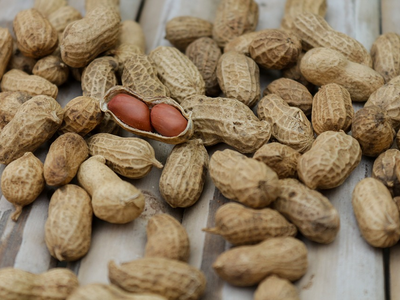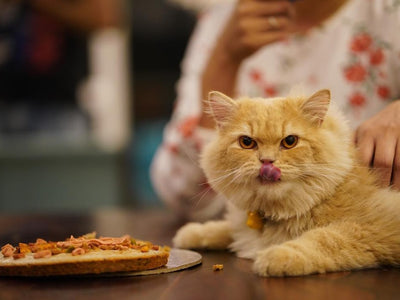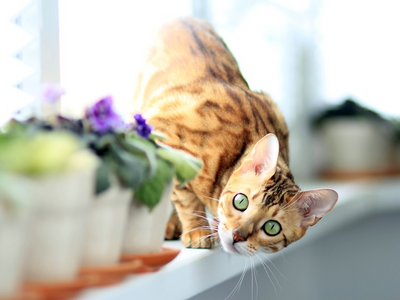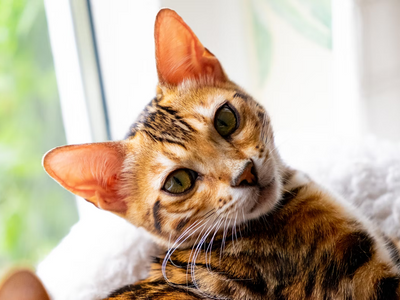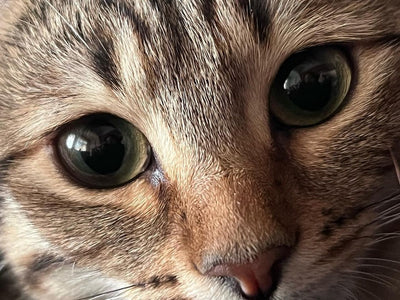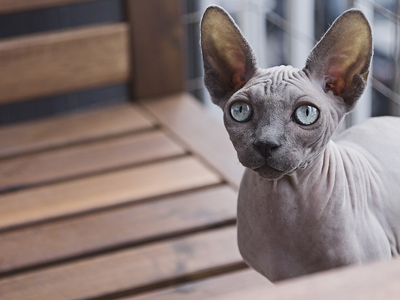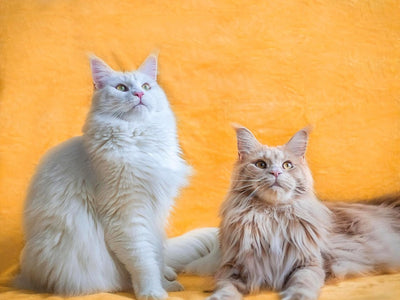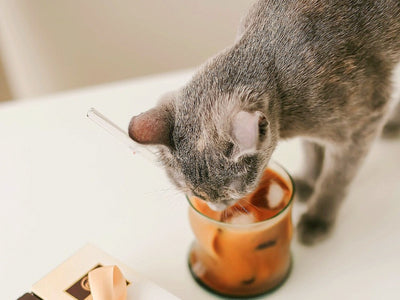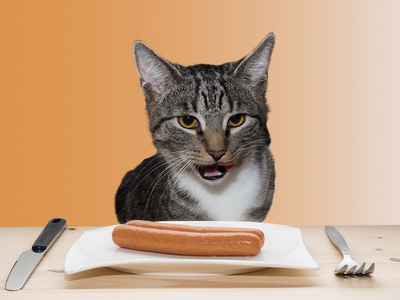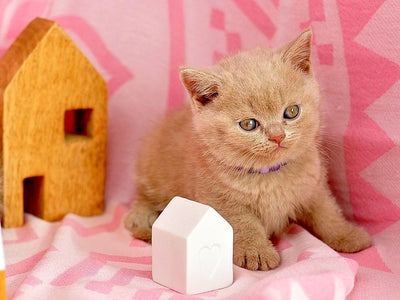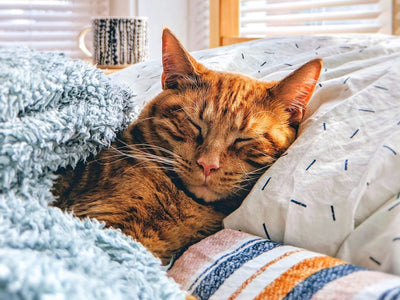30.07.2022
British Shorthair eye problems explained in detail
British Shorthair cats are considered a healthy breed with a long lifespan, but it doesn’t make them resistant to some common diseases that affect felines in general, including eye disorders.
To help you understand how to help your furry companion if you notice such issues, we present common British Shorthair eye problems and teach you how to recognise them. You'll also learn how to prevent such issues by choosing adequate food for your feline friend.
Are British Shorthair cats prone to eye disorders?

I can only suffer from the lack of your attention.
Source: Boris Debusscher
Genetically speaking, British Shorthair cats are not prone to eye disorders more than other cat breeds.
Many future cat parents worry that their British Shorthair kittens might suffer from eye issues because their head shape is similar to Persian cats. These felines have a brachycephalic head shape, which means their heads are short and rounded. As a result, Persians have narrowed tear ducts causing improper drainage of tears and mucus. This issue leads to a build-up around their eyes and frequent infections.
While British Shorthairs have a slightly brachycephalic head shape, they don't have any tear duct issues but can develop other eye disorders, including:
- Cataracts
- Glaucoma
- Eye infections
Cataracts
Himalayans, Birmans, and British Shorthairs are felines with a genetic predisposition to develop cataracts. When this happens, a normally clear lens becomes opaque, preventing light from reaching the retina and reducing vision.
Cataracts can affect one or both eyes and be caused by various factors, including:
- Age
- Injury
- Inflammation
- Viral, fungal, bacterial, or protozoal infections
- Genetic factors
- Metabolic diseases (diabetes and high blood pressure)
- Inability to metabolise specific proteins
- Nutritional imbalance
Regular visits to the vet are the only way to prevent the growth of the cataract and save your kitty's vision, as the symptoms in the early stages can be impossible to notice.
As the disease progresses, besides the milky spot covering the entire lens, you may notice the following behavioural symptoms in your cat:
- Uncertain footing
- Misjudged distances and jumps
- Tripping over
- Bumping into stuff
- Inability to recognise family members
- Difficulty locating the food bowl or litter tray
- Unusual meowing
Glaucoma

Reading about all this makes me nervous. I can’t imagine how you feel.
Source: Ani Adigyozalyan
Feline glaucoma is a condition in which the watery fluid in the front part of the eye (behind the lens) doesn't drain normally. The fluid accumulation causes pressure on the optical nerve, leading to nerve damage and impaired vision. If left untreated, this condition can lead to partial or total blindness.
There are two types of glaucoma in British Shorthairs:
- Primary—rare, inherited, and bilateral
- Secondary—more common, can affect one or both eyes
The most frequent cause of secondary glaucoma is uveitis—a severe eye inflammation caused by:
- Feline immunodeficiency virus (FIV)
- Feline leukaemia (FeLV)
- Toxoplasmosis
- Feline infectious peritonitis (FIP)
The first signs of glaucoma are usually subtle and become more prominent as the disease progresses. Owners will commonly notice their feline's eyes becoming progressively cloudy and enlarged. Besides these, usual symptoms of this disease include:
- Squinting and rapid blinking
- Dilated pupils that don't react to light
- Lethargy
- Watery discharge
- Eye rubbing
- Loss of appetite
- Headaches
- Red blood vessels in the eyes
Glaucoma is incurable but can be managed with dorzolamide and/or timolol eye drops, which reduce pressure and pain. Steroids may also be necessary if glaucoma is caused by inflammation. In more severe cases, your cat may even require surgical eye removal.
Eye infections
Healthy feline eyes are clear and bright. The pupils are the same size, and there is no discharge, redness, or puffiness. When you look into your kitty's eyes, you should see no cloudiness or the third eyelid. If you notice anything out of the ordinary, your British Shorthair may be suffering from an eye infection.
The table below shows the most common causes of eye infections, usual symptoms, and treatment options:
|
Cause |
Symptoms |
Solution |
|
Allergies caused by:
|
|
|
|
Conjunctivitis caused by:
|
|
|
|
Feline Herpesvirus (FHV-1) |
|
|
|
Blepharitis caused by:
|
|
|
|
Keratoconjunctivitis Sicca (aka dry eyes or keratitis) |
|
|
Caring for your British Shorthair's eyes

You know, this grooming thing should be your job.
Source: Eric Han
It's essential to get your feline friend to the vet if you notice any issues, as this is the best way to determine the exact cause of the eye infection and the appropriate treatment. Regular check-ups will also ensure you catch many of the ailments right at the beginning, which will help you manage them and improve your kitty's quality of life.
Besides vet visits, you can preserve your feline’s eye health by:
- Cleaning their eyes regularly
- Feeding them high-quality food
Cleaning your British Shorthair's eyes
You probably groom your British Shorthair a few times a week, so you should make it a habit to clean their eyes as a part of this session. Here’s how to do it safely:
- Damp a cotton ball or a make-up pad with water or the eye cleaning solution
- Wipe the areas around your kitty's eyes gently (use a separate cotton ball for each eye)
- Pat the area dry with a soft cloth or a dry cotton pad
Feeding your British Shorthair high-quality food

It’s meat that I want, spare me that green stuff you keep saying is healthy.
Image (c) Untamed
Health problems such as diabetes, high blood pressure, food allergies, and difficulty metabolising certain proteins are the root cause of eye problems in British Shorthairs. All these issues are typically the consequence of poor diet. For this reason, it is crucial to provide your feline companion with suitable portions of high-quality food that satisfies their nutritional needs.
All felines have similar dietary requirements, so whatever type of cat food you choose—wet, dry, semi-moist, B.A.R.F., or homemade—you should ensure your kitty gets adequate amounts of:
- Animal protein
- Animal fat
Why animal protein?
Meat and fish are the only sources of essential amino acids that felines need to:
- Maintain a high energy level and normal organ function
- Build strong muscles
- Have healthy eyes, skin, and coat
The three most important amino acids are:
- Taurine—It's crucial for normal vision, digestion, heart function, immune system, healthy pregnancy, and foetal development
- Lysine—This amino acid supports normal eye function, respiratory health, and immune system. Food rich in lysine helps manage common health niggles, such as sneezing, runny nose, watery eyes, and inflamed eyes
- Arginine—It allows the ammonia created after digesting a high-protein meal to turn into urea, which is eliminated from the body through urinating. If the excess ammonia remains in the blood, your cat can experience severe issues, including vomiting, muscle spasms, ataxia, hyperesthesia, coma, and similar, with death becoming imminent
Why not vegetable protein?
Cats are obligate carnivores. They lack enzymes to properly digest vegetables or grains and absorb all the nutrients they need to function normally from these types of foods. Such ingredients can cause digestive issues, such as diarrhoea and vomiting.
Food containing too many carbohydrates also leads to obesity and other related illnesses, such as:
- Diabetes
- Kidney disease
- Heart disease
- Joint issues
You should steer clear of any cat food that lists the following ingredients:
You can occasionally offer your British Shorthair tiny amounts of banana, mango, cooked carrots, green beans, or broccoli, especially if they are constipated, but those should not be a part of their regular diet.
Why animal fat?
Animal fat is a source of healthy fatty acids, such as docosahexaenoic acid, which improve the brain and eye development. Felines also love its taste and texture, so it's an excellent (and natural) taste enhancer.
Recommended sources and quantities of macronutrients in cat food
The table below presents the recommended quantities of macronutrients in cat food and the ingredients that contain them:
|
Macronutrients |
Recommended quantities |
Sources |
|
Animal protein |
At least 50% |
|
|
Animal fat |
No more than 20% |
Can Untamed preserve your British Shorthair's vision?

Untamed is your best bet at keeping your kitty healthy and happy!
Image (c) Untamed
Untamed meals are your best bet at keeping your felines healthy and their vision intact. Our recipes are as close to what cats eat in nature as possible and ensure your felines' nutritional needs are met.
Our dishes are:
- High-protein—Every Untamed tin contains twice as much animal protein as most other products on the market. We use the high-quality whole meat and fish with a hint of ham to make sure even fussy kitties who don't usually like wet food enjoy our meals
- Low-carb—Grain-free, low-carb diet helps manage your British Shorthair's weight and is suitable for diabetic cats
- Allergen-free—We avoid all known allergens and offer a few single-protein meals—Tuck-In Tuna in Jelly and Chocka Chicken in Jelly—for super sensitive felines
- Vet-formulated—All our dishes are created under veterinary supervision to ensure all your cat's nutritional needs are satisfied. Our food is suitable for kittens, adult cats, seniors struggling with gum issues, and pregnant queens
Order Untamed and ensure your British Shorthair gets the healthiest and tastiest meals!
How to order Untamed
Three simple steps are all it takes to get a versatile and delicious Untamed trial pack right at your doorstep:
- Complete our Try Now quiz
- Choose the products for your kitty
- Place the order
The packet will arrive in a day, and once your feline friend samples all the options, we can resupply your stock of healthy tailor-made kitty meals every month.
Once you start feeding your British Shorthair Untamed meals, you can expect the following results:
- Week 1—Better mood and digestion
- Month 2—Prettier fur, reduced shedding, fewer hairballs
- Month 4—No gastrointestinal issues, clear eyes
- Life-long—Efficient immune response, improved health, effortless weight management

![Associated image for What human food can Sphynx cats eat? [Comprehensive list]](http://untamed.com/cdn/shop/articles/what_human_food_can_sphynx_cats_eat_Featured_400x300_crop_center.jpg?v=1648705074)
